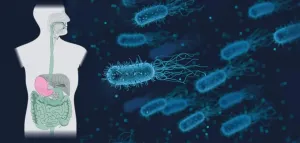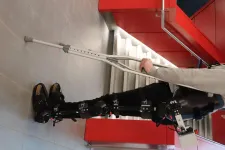Weed invaders are getting faster
A new study shows invasive plants are adapting to new habitats and new climates at an increasing pace - and especially so in tropical environments
2021-03-15
(Press-News.org) Dr Daniel Montesinos is a Senior Research Fellow at the Australian Tropical Herbarium, at James Cook University in Cairns. He is studying weeds to better understand (among other things) how they might respond to climate change.
He said most invasive plants are characterised by their rapid pace when it comes to taking up nutrients, growing, and reproducing - and they're even faster in the regions they invade.
"New experiments comparing populations from distant regions show a clear trend for already-fast invasive plants to rapidly adapt even faster traits in their non-native regions," Dr Montesinos said.
This is further pronounced in the tropics and sub-tropics.
"Even though invasives' growth rates are already among the highest for plants, when they invade new territory in the tropics and sub-tropics, they develop those weedy traits more rapidly than they do when they invade in temperate climates," Dr Montesinos said.
"This might be explained by higher chemical processing at higher temperatures, which suggests that global warming will increase invasive impacts in these regions, as long as enough water is available."
Dr Montesinos said invasive plants usually take hold in land that has been disturbed by human intervention (for example farms and roadsides) and then spread to other habitats.
"It's important to recognise disturbed habitats as a gateway for plant invasions," Dr Montesinos said. "If we can limit disturbance of natural environments, we can reduce biological invasions, particularly in tropical areas that are threatened by increasing human encroachment."
Dr Montesinos said that range expansions by native species trying to 'escape' from changes in climate could be a further complication. This involves climate change enabling some native plants to grow where they previously could not.
"This can be seen as a double-edged sword - some native species will survive climate change, but they might achieve that by disrupting the habitats of others.
"The study of invasion ecology is complex, but invasive species can be models in which to study, and make predictions about, the responses of native plants to climate change, giving us clues on improved management techniques for both natives and invasives," Dr Montesinos said.
INFORMATION:
'Fast invasives fastly become faster: Invasive plants align largely with the fast side of the plant economics spectrum' is published in the latest edition of the British Ecological Society's Journal of Ecology.
ELSE PRESS RELEASES FROM THIS DATE:
2021-03-15
A new concept of on-demand drug delivery system has emerged in which the drugs are automatically released from in vivo medical devices simply by shining light on the skin.
A research team led by Professor Sei Kwang Hahn of the Department of Materials Science and Engineering and Professor Kilwon Cho of the Department of Chemical Engineering at POSTECH have together developed an on-demand drug delivery system (DDS) using an organic photovoltaic cell coated with upconversion nanoparticles. This newly developed DDS allows nanoparticles to convert skin-penetrating near-infrared (NIR) light into visible light so that drug release can be controlled in medical ...
2021-03-15
An international team of researchers, affiliated with UNIST has unveiled a novel technology that could improve the learning ability of artificial neural networks (ANNs).
Professor Hongsik Jeong and his research team in the Department of Materials Science and Engineering at UNIST, in collaboration with researchers from Tsinghua University in China, proposed a new learning method to improve the learning ability of ANN chips by challenging its instability.
Artificial neural network chips are capable of mimicking the structural, functional and biological features of human neural networks, and thus have been considered the technology of the future. In this study, the research team demonstrated the effectiveness of the proposed learning method ...
2021-03-15
A chromatin-regulating enzyme has been shown by in-depth interdisciplinary investigations to be a key driver of a common type of lung cancer. Drugs that target the enzyme could improve treatment and survival rates for this particular cancer.
"Squamous cell carcinoma represents nearly one third of all lung cancers in humans," says KAUST structural biologist Lukasz Jaremko, who led the research along with colleagues at Stanford University and The University of Texas MD Anderson Cancer Center, U.S. "Our joint structural and dynamics investigations, including enzymatic activity studies, genetic analyses, and mouse model and human cell results, ...
2021-03-15
Basic, acidic, basic again: for pathogenic bacteria such as Salmonella, the human digestive tract is a sea change. So how do the bacteria manage to react to these changes? A team of researchers from the Max Planck Institute for Terrestrial Microbiology in Marburg led by Andreas Diepold has now provided a possible explanation: pathogenic bacteria can change components of their injection apparatus on the fly - like changing the tires on a moving car - to enable a rapid response.
Some of the best-known human pathogens - from the plague bacterium Yersinia pestis to the diarrhea pathogen Salmonella - use a tiny hypodermic needle to inject disease-causing ...
2021-03-15
Despite pandemic-driven restrictions on movement, there were over 12,000 accidents in Madrid in 2020, leading to 31 fatalities. In Barcelona, there were more than 5,700 collisions, causing 14 deaths. Pedestrian and vehicle safety is a priority, which is why a research project at the Universitat Oberta de Catalunya (UOC) is harnessing artificial intelligence (AI) to make decisions that will make cities safer. The researchers have looked into the correlation between the complexity of certain urban areas and the likelihood of an accident occurring there.
According to the researchers, the data they have gathered can be used to train neural networks to detect probable ...
2021-03-15
Last December, the Parliament of Catalonia unanimously approved the incorporation into its legislation of second-order violence against those who give their support to victims of violence against women. A recent study compiles testimonies of victims, and analyses this form of intimidation
To tackle violence against women, it is essential for victims to have the support of those surrounding them and to prevent them from being isolated. But what happens if the people around them are not protected? The work of Jose Ramón Flecha García, founder of the Community of Research on Excellence for All (CREA), and various academic teams, has led to the approval in the Catalan parliament of the first legislation on the Second Order of Sexual Harassment (SOSH).
The following point ...
2021-03-15
Robotics researchers are developing exoskeletons and prosthetic legs capable of thinking and moving on their own using sophisticated artificial intelligence (AI) technology.
The system combines computer vision and deep-learning AI to mimic how able-bodied people walk by seeing their surroundings and adjusting their movements.
"We're giving robotic legs vision so they can control themselves," said Brokoslaw Laschowski, a PhD candidate in systems design engineering who leads a University of Waterloo research project called ExoNet.
Exoskeletons and prosthetic devices operated by motors already exist, but users must manually ...
2021-03-15
In 2016, a collaborative group of research and education specialists received funding from the National Science Foundation for the project 'Building a Comprehensive Evolutionary History of Flagellate Plants' -- also known as 'Genealogy of Flagellate Plants' (GoFlag). Members of the team have the ambitious goal of reconstructing the 470-million-year history of one of the most diverse groups of land plants on the planet.
The first of several forthcoming publications from the project was published in a recent issue of Applications in Plant Sciences. In their inaugural article, the researchers report on the successful development of 451 nuclear target enrichment probes, which correspond to short, variable loci.
By creating a standard ...
2021-03-15
When rain began falling in northern Georgia on Sept. 15, 2009, little did Atlantans know that they would bear witness to epic flooding throughout the city. Neighborhoods, like Peachtree Hills, were submerged; Georgia's busiest expressway was underwater, as were roads and bridges; untreated sewage mingled with rising flood waters; cars and people were swept away. Then-Georgia-governor, Sonny Perdue, declared a state of emergency.
Moisture from the Gulf of Mexico fueled the flood of 2009. A decade later, Arizona State University researchers are asking whether a ...
2021-03-15
The habitats of freshwater fish species are threatened by global warming, mainly due to rising water temperatures. A 3.2-degree Celsius increase in global mean temperature would threaten more than half of the habitat for one third of all freshwater fish species. The number of species at risk is ten times smaller if warming is limited to 1.5 degrees. This is the conclusion of a study led by Radboud University, in collaboration with Utrecht University, PBL Netherlands Environmental Assessment Agency, Leiden University and others, and published in Nature Communications ...
LAST 30 PRESS RELEASES:
[Press-News.org] Weed invaders are getting faster
A new study shows invasive plants are adapting to new habitats and new climates at an increasing pace - and especially so in tropical environments





